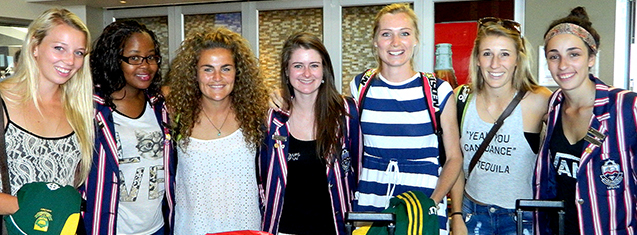
Nicole Walraven, Lethabo Maebana (SRC: Media and Marketing), Tanya Britz, Kerry-beth Berry (SRC: Day- and Commuting Students), Cornelle Botha, Liné Malan, and Dominique De Gouveia (SRC: Sport)
Tanya Britz, Nicole Walraven, Cormelle Botha, and Liné Malan turned out for the Protea hockey team in the two series against Chile and Belgium in Cape Town from 22 January to 2 February.
Britz has been playing for the senior Protea team since her matric year at Sentraal High School, but for Walraven, Botha, and Malan this series marked their debut for the senior national hockey team. The series against Chile and Belgium both ended in draws for the Protea women’s team.
Shortly before the end of the series against Belgium, the three Kovsies making their debut for the senior national hockey team had the following to say to the Volksblad:
“It was unbelievably inspiring to stand next to these incredible players wearing the Green and Gold and to sing the national anthem in front of a home crowd. It was worth all the hard work and dedication. The support and acceptance of my team mates helped calm my nerves when the whistle blew. It was such an honour – it still feels like a dream. (Nicole Walraven)
“It is an indescribable feeling, something that I dreamt about for years. The nerves niggled before the game, but it was such a huge privilege and honour to play in the Protea colours.” (Cornelle Botha)
“It’s difficult to describe the feeling a person experiences when you sing the national anthem wearing the Green and Gold. It was a feeling of pride; the accompanying excitement felt as if I had a thousand butterflies in my stomach. It’s a moment I shall never forget and a dream come true.” (Liné Malan)